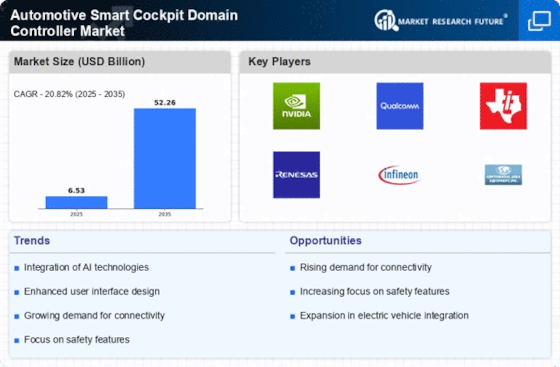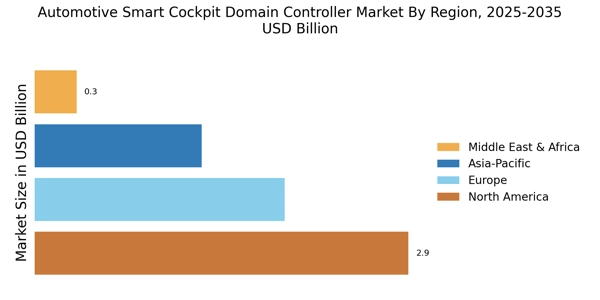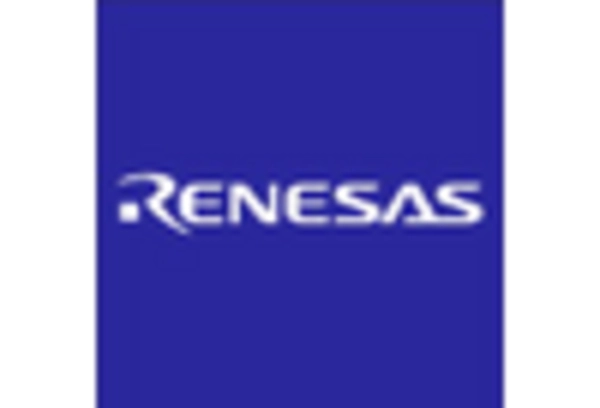Shift Towards Electric Vehicles
The transition towards electric vehicles (EVs) is emerging as a critical driver for the Automotive Smart Cockpit Domain Controller Market. As manufacturers pivot to produce more electric models, the need for advanced cockpit technologies that support electric drivetrains becomes apparent. Domain controllers play a vital role in managing the complex interactions between various vehicle systems, including battery management and energy efficiency. Reports suggest that the EV market could account for over 30% of total vehicle sales by 2030, which would necessitate the integration of sophisticated cockpit solutions. This shift not only enhances the driving experience but also aligns with the broader trends of sustainability and innovation within the Automotive Smart Cockpit Domain Controller Market.
Regulatory Push for Safety Standards
The regulatory push for enhanced safety standards is a crucial driver for the Automotive Smart Cockpit Domain Controller Market. Governments worldwide are increasingly implementing stringent regulations aimed at improving vehicle safety, which often necessitates the integration of advanced technologies. Domain controllers are essential for processing data from safety systems, such as collision avoidance and emergency braking, ensuring compliance with these regulations. As safety becomes a paramount concern for consumers and regulators alike, the demand for vehicles equipped with advanced safety features is likely to rise. Industry forecasts suggest that the market for automotive safety systems could exceed 40 billion dollars by 2025, further propelling the growth of the Automotive Smart Cockpit Domain Controller Market.
Rising Demand for Connectivity Features
The growing consumer demand for connectivity features in vehicles serves as a substantial driver for the Automotive Smart Cockpit Domain Controller Market. Modern drivers increasingly expect seamless integration of their mobile devices with in-car systems, enabling features such as navigation, entertainment, and communication. The proliferation of 5G technology is likely to further enhance these capabilities, allowing for faster data transmission and improved user experiences. Market analysis indicates that the connected car market could surpass 200 billion dollars by 2025, underscoring the importance of domain controllers in facilitating these advanced connectivity features. As automakers strive to meet consumer expectations, the Automotive Smart Cockpit Domain Controller Market is poised for significant growth.
Consumer Preference for Enhanced User Experience
Consumer preference for enhanced user experience is a significant driver influencing the Automotive Smart Cockpit Domain Controller Market. As vehicles evolve into mobile technology hubs, drivers and passengers alike expect intuitive interfaces, personalized settings, and responsive controls. The demand for touchscreens, voice recognition, and gesture control systems is on the rise, prompting manufacturers to invest in advanced domain controllers that can support these features. Market Research Future indicates that user experience is a top priority for consumers when selecting a vehicle, with many willing to pay a premium for enhanced cockpit technologies. This trend underscores the necessity for innovation within the Automotive Smart Cockpit Domain Controller Market, as companies strive to differentiate their offerings in a competitive landscape.
Integration of Advanced Driver Assistance Systems
The integration of advanced driver assistance systems (ADAS) is a pivotal driver for the Automotive Smart Cockpit Domain Controller Market. As vehicles increasingly incorporate features such as adaptive cruise control, lane-keeping assistance, and automated parking, the demand for sophisticated domain controllers rises. These systems require robust processing capabilities to analyze data from various sensors and cameras, which the domain controllers provide. According to industry estimates, the ADAS market is projected to grow significantly, potentially reaching a valuation of over 60 billion dollars by 2025. This growth directly influences the Automotive Smart Cockpit Domain Controller Market, as manufacturers seek to enhance vehicle safety and user experience through advanced technology integration.

















